Since 1995, the Pullias Center has engaged in action-oriented projects and research to improve college access and student success, promote equity and diversity, and enhance the performance of postsecondary institutions. The Pullias Center publishes a range of reports, guides, briefs, tool kits and more informed by this higher education research. We have created more than 100 publications and all are free to download here. You can also visit other pages to view articles and chapters as well as numerous books authored by our researchers.
Enter below to search titles, authors, categories, and document descriptions or scroll down for suggestions.

The College & Financial Aid Guide for: AB540 Undocumented Immigrant Students
Download 585.63 KB 1239 downloads
The Role of Boards in College Access Programs: Creating and Maintaining Quality
Download 103.81 KB 2777 downloads
Putting Money on the Table: Information, Financial Aid and Access to College
Download 118.29 KB 1235 downloads
The Impact of Peers on College Preparation: A Review of the Literature
Download 96.47 KB 1449 downloads
Show Us the Money: Low-Income Students, Families, and Financial Aid
Download 462.38 KB 1201 downloads
Mentoring Scaffoldings: Do They Promote College Access?
Download 96.47 KB 1506 downloadsPopular Searches
College Access
The Delphi Project
Digital Equity
STEM Reform
Racial Equity
Shared Equity Leadership
Institutional Culture and Change
Guides & Toolkits
Jump to: Recently Added, Featured, Trending, Most Downloads
Recently Added
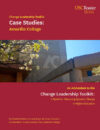
Amarillo College Case Study
Elizabeth Holcombe, Ángel de Jesus Gonzalez and Russell Lowery-Hart (Amarillo College)
Pullias Center for Higher Education (2023)
This case study documents the transformation of Amarillo College (AC) from an institution with low retention and completion rates to a community college that has been recognized nationally for its innovative approach to improving student success. In the midst of a budget crisis, President Russell Lowery-Hart worked to both cut costs and streamline bureaucratic processes, while at the same time transforming systems and structures to improve outcomes for students and tackle the challenges of poverty that were holding students back. Facing declining enrollments, a nearly $4 million budget cut from the state, and told by the Board that tuition could not increase, Russell had to figure out a way to cut costs and simultaneously improve the College’s low completion and transfer rates.
Categories: Leadership, Equity and Leadership
Change Leadership Toolkit Case Studies equity and leadership leadership
Download 392.39 KB 3216 Downloads
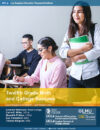
LAERI Research Report: 12th Grade Math and College Success
Leonard Wainstein, Carrie E. Miller, Meredith Phillips, Kyo Yamashiro, Tatiana Melguizo
UCLA Los Angeles Education Research Institute (2023)
In a new report, Twelfth Grade Math and College Success, LAERI-affiliated researchers build on their work in Twelfth Grade Math and College Access and examine the impact of taking a math course in twelfth grade on L.A. Unified students' science, technology, engineering, and math (STEM) course taking and college success.
Categories: Math Equity, Student Success
college access and success stem tatiana melguizo
Download 2.81 MB 1946 Downloads
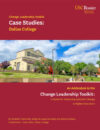
Dallas College Case Study
Elizabeth Holcombe, Ángel de Jesus Gonzalez, Adrianna Kezar and Karen Stills (Dallas College)
Pullias Center for Higher Education (2023)
Karen Stills, Senior Associate Vice Chancellor for Student Success at Dallas College (DC), led an effort to transform advising for the students at this community college beginning in 2020. In the midst of a merger and reorganization effort, where seven campuses of the Dallas Community College District were consolidated into a single multi-campus institution (Dallas College), Karen had the opportunity to completely rethink advising structures and systems in ways that would improve outcomes for DC’s 100,000+ students. Karen worked with her team to develop an entirely new training and professional development model for the Success Coaches to help them better support students in their educational journeys.
Categories: Leadership, Equity and Leadership
Change Leadership Toolkit Case Studies Equity & Leadership leadership
Download 355.39 KB 3606 Downloads
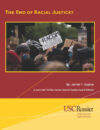
The End of Racial Justice?
Jarrett T. Gupton
Pullias Center for Higher Education (2023)
This policy brief analyzes the regressive higher education policy backlash through a racial justice evaluative framework and presents a typology of higher education reform legislation. The brief considers what this means for racial justice in democracy and higher education.
Categories: Policymaking, Racial Equity, Leadership
equity alumni award policymaking alumni leadership racial equity
Download 774.95 KB 3729 Downloads
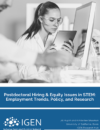
Postdoctoral Hiring & Equity Issues in STEM: Employment Trends, Policy, and Research
Jill Huynh, Kimberlee Shauman
Pullias Center for Higher Education (2021)
Inequities in postdoctoral hiring reflect and contribute to inequities in the scientific labor force more broadly. Although their positions are usually temporary, postdoctorates comprise a substantial proportion of the STEM research workforce and conduct a large share of the work generating laboratory productivity. These researchers are a highly educated and productive, yet relatively inexpensive, source of labor compared to graduate students and staff scientists.
Categories: Equity, Equity and Graduate Education, IGEN
equity graduate education IGEN
Download 5.05 MB 2981 Downloads
Featured
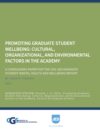
Promoting Graduate Student Wellbeing: Cultural, Organizational, and Environmental Factors in the Academy
Dr. Julie R. Posselt
Pullias Center for Higher Education (2021)
The purpose of this essay is to synthesize current knowledge about cultural, organizational, and environmental factors in higher education which are known to support or inhibit the wellbeing of graduate students. Given that students’ intellectual growth as graduate students is situated within a multi-dimensional developmental process, I pay special attention to ways that graduate education stakeholders-- including graduate school administrators, directors of graduate studies, faculty members, and other staff-- can link student development with the promotion of wellbeing. Finally, I make recommendations for colleges and universities to facilitate learning environments where students can thrive.
Categories: Graduate Education, Equity and Leadership
equity and leadership graduate education julie posselt
Download 608.78 KB 20117 Downloads
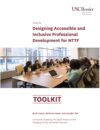
Designing Accessible and Inclusive Professional Development for NTTF Toolkit
KC Culver, Adrianna Kezar, and Jennifer Yeh
Pullias Center for Higher Education (2022)
This toolkit is meant to accompany our report “Designing Accessible and Inclusive Professional Development for NTTF,” which was created as part of the Delphi Project on the Changing Faculty and Student Success. In this report, we found that a variety of professional development opportunities are often necessary to support NTTF, given their needs, interests, and time constraints. More intensive professional development programs, including faculty learning communities, curricular redesign and departmental action teams, certificate programs, and discussion groups, offer NTTF sustained opportunities for learning and interaction with colleagues. These more intensive programs can offer a number of benefits for NTTF: instructional effectiveness, a sense of belonging, institutional integration and knowledge of resources, a professional network, career development and advancement, and opportunities for advocacy and leadership development.
Categories: Delphi Project
delphi project non-tenure-track faculty
Download 1.96 MB 21237 Downloads
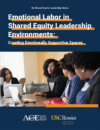
Emotional Labor in Shared Equity Leadership Environments: Creating Emotionally Supportive Spaces
Darsella Vigil, Elizabeth Holcombe, Natsumi Ueda, Adrianna Kezar
Pullias Center for Higher Education (2023)
In this research brief, part of the On Shared Equity Leadership series, we explore what emotional labor looks like in environments where responsibility for DEI leadership is broadly distributed and shared across multiple campus stakeholders, rather than siloed or isolated in a single person or office. While the challenging emotions and emotional labor that accompany DEI work do not disappear in SEL environments, we did find some evidence that the burden is minimized by working in community with other leaders who share the labor. The emotional labor that does still occur is often less burdensome and overwhelming to those involved because of the support they have from colleagues who share both the work and the emotions that come with it. This report first summarizes some of the existing research on emotional labor and DEI work before highlighting the ways in which SEL can alleviate different types of emotional labor.
Categories: Shared Equity Leadership, Equity and Leadership
shared equity leadership adrianna kezar equity and leadership
Download 1.77 MB 5696 Downloads
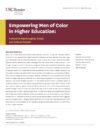
Empowering Men of Color in Higher Education: A Focus on Psychological, Social, and Cultural Factors
Adrian H. Huerta, Maria Romero-Morales, Jude Paul Matias Dizon, Maritza E. Salazar, Julie Vu Nguyen
Pullias Center for Higher Education (2021)
Men of Color
Download 446.17 KB 12876 Downloads
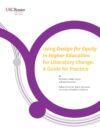
Using Design for Equity in Higher Education for Liberatory Change: A Guide for Practice
KC Culver, Jordan Harper, and Adrianna Kezar
Pullias Center for Higher Education (2021)
This toolkit helps design teams engage in this process of implementing the Design for Equity in Higher Education model, For each phase of the model, this toolkit provides a short description and offers some questions and suggestions to guide practice.
Categories: Delphi Project, Racial Equity, Guides
design thinking policymaking delphi project racial equity
Download 326.93 KB 30235 Downloads
Trending
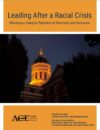
Leading After a Racial Crisis: Weaving a Campus Tapestry of Diversity and Inclusion
Sharon Fries-Britt and Adrianna Kezar (2020)
A report from the American Council on Education (ACE) on research exploring University of Missouri’s progress with diversity, equity, and inclusion in the years following the 2015-16 racial crisis on campus. Note: This document is hosted on the ACE website.
Categories: Institutional Culture, Student Success, Racial Equity
ACE administrator adrianna kezar DEI diversity institutional change institutional culture leadership lorelle espinosa racial equity student success
Download 206.54 KB 16777 Downloads

Bolstering First-Year Success Through Digital Tools
Tattiya Maruco, Zoë B. Corwin, Christine Rocha, and Maria Romero-Morales (2020)
To address the challenges of fostering a sense of belonging and ultimately improving academic success, USC’s Pullias Center for Higher Education and the Get Schooled Foundation partnered with California State University Dominguez Hills (CSUDH) to create an online tool called Toros Charge On! designed to assist students in navigating campus resources and learning skills conducive to college success. This report shares the findings from that study.
Categories: College Access, Digital Equity, Student Success
college access and success technology zoe corwin
Download 4.49 MB 21787 Downloads

Beyond the Board: Findings from the Field
Zoë B. Corwin, Tattiya Maruco, Neftalie Williams, Robert Reichardt, Maria Romero-Morales, Christine Rocha, and Constanza Astiazaran (2019)
A groundbreaking study of skateboarding culture that explores the lives of underrepresented young adult skateboarders within a society that isolates them due to their negative misconceptions and preconceived notions. The research team examined skateboarding culture through the skateboarders' perception of life and reveals how skateboarding shapes and supports them in terms of personal development.
Categories: College Access, Skateboarding
skateboarding zoe corwin
Download 4.75 MB 14178 Downloads
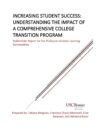
Increasing Student Success: Understanding the Impact of a Comprehensive College Transition Program
Tatiana Melguizo, Francisco (Paco) Martorell, Elise Swanson, & Adrianna Kezar (2020)
This report summarizes the main findings of the Promoting At-Promise Student Success Project (PASS), formerly known as the Thompson Scholars Learning Communities (TSLC) Study. The project seeks to explore, document, and better understand whether the PASS program, a comprehensive college transition program at three University of Nebraska campuses, translates into greater student success.
Categories: College Access, Student Success
adrianna kezar elise swanson student success tatiana melguizo tslc
Download 292.46 KB 24325 Downloads
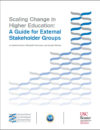
Scaling Change in Higher Education: A Guide for Stakeholder Groups
Adrianna Kezar, Elizabeth Holcombe, Joseph Kitchen (2018)
Created for key external stakeholder groups that support change and reform of the higher education enterprise, this guide presents a toolkit with practical advice on how to be effective partners in working with colleges and universities to support changes that go to scale.
The guide serves as an action-oriented companion piece to the report, Scaling Improvement in STEM Learning Environments: The Strategic Role of a National Organization.
Categories: STEM Reform, Guides
stem
Download 543.30 KB 21842 Downloads
All Time Most Downloads
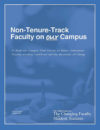
Non-Tenure-Track Faculty on our Campus: A Guide for Campus Task Forces to Better Understand Faculty Working Conditions and the Necessity of Change
The Delphi Project on the Changing Faculty and Student Success (2012)
This guide is designed for use by task forces, committees, or groups who would like to examine non-tenure-track faculty practices and issues at the campus level. Its question sections, discussion questions, and concluding questions guide practitioners through the process of examining non-tenure-track faculty issues on campus and help them to better understand challenges associated with current practices and begin to build the rationale for change.
Categories: Delphi Project, Guides
adjunct faculty assessment contingent faculty non-tenure-track faculty salary and benefits worksheets
Download 981.28 KB 67801 Downloads
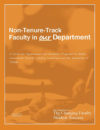
Non-Tenure-Track Faculty in our Department: A Guide for Departments and Academic Programs to Better Understand Faculty Working Conditions and the Necessity of Change
The Delphi Project on the Changing Faculty and Student Success (2012)
This guide is designed for use by faculty and staff at the department level who would like to examine non-tenure-track faculty practices and issues. Its question sections, discussion questions, and concluding questions guide practitioners through the process of examining non-tenure-track faculty issues in the department and help them to better understand challenges associated with current practices and begin to build the rationale for change.
Categories: Delphi Project, Guides
adjunct faculty assessment contingent faculty non-tenure-track faculty salary and benefits worksheets
Download 784.45 KB 62973 Downloads
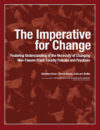
The Imperative for Change: Fostering Understanding of the Necessity of Changing Non-Tenure-Track Faculty Policies and Practices
Adrianna Kezar, Daniel Maxey, Lara Badke (2014)
This summary outlines the necessity for addressing the changing faculty and its implications for student learning outcomes, equity, and institutional risk management. It aims to build an understanding of the implications of the current faculty model and policies and practices affecting non-tenure-track faculty, as well as to facilitate a conversation about change that begins with a shared appreciation of the potential risks of inaction or inattention to these problems.
Categories: Delphi Project, Student Success
adjunct faculty community college contingent faculty non-tenure-track faculty salary and benefits statistics student success
Download 451.35 KB 58017 Downloads
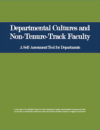
Departmental Cultures and Non-Tenure-Track Faculty: A Self-Assessment Tool for Departments
The Delphi Project on the Changing Faculty and Student Success (2015)
This self-assessment tool is a detailed survey that can be used by colleges and universities to get direct, actionable feedback from non-tenure-track faculty. The survey, which can be administered by campus leaders, department chairs, union leaders or even by non-tenure-track faculty groups themselves, can be used to assess existing departmental cultures, with the goal to improve campus climate based on those findings.
The tool also includes profiles and detailed descriptions of each culture, which can guide departmental faculty and staff towards creating a more supportive environment for their non-tenure-track colleagues.
Categories: Delphi Project, Guides
adjunct faculty assessment contingent faculty non-tenure-track faculty salary and benefits
Download 267.03 KB 52346 Downloads
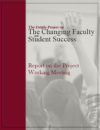
Report on the Project Working Meeting
The Delphi Project on the Changing Faculty and Student Success (2013)
On May 18, 2012, more than 30 participants convened outside Washington, D.C. to discuss the issues faced by non tenure track faculty and to formulate strategies to respond to these challenges in new ways. The two meta-strategies that emerged from the meeting and are captured in this report are the result of a year of planning and collaboration among the project staff, our partners at AAC&U, and participants representing key stakeholder groups from across higher education. Following the meta-strategies is a summary of the meeting, which captures the various perspectives, concerns, and ideas exchanged among project participants in a convening of the full group, as well as more targeted small group discussions.
Categories: Delphi Project, Student Success
adjunct faculty community college contingent faculty new faculty models non-tenure-track faculty salary and benefits statistics student success
Download 2.30 MB 46264 Downloads
